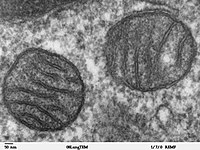
Melatonin attenuates post ovulatory oocyte dysfunction by regulating SIRT 1 expression
Sign Up to like & getrecommendations! Published in 2018 at "Fertility and Sterility"
DOI: 10.1016/j.fertnstert.2018.07.998
Abstract: The quality of postovulatory metaphase II oocytes undergoes a time-dependent deterioration as a result of the aging process. Melatonin is considered to be an anti-aging agent. However, the underlying mechanisms of how melatonin improves the… read more here.
Keywords: oocyte aging; expression; melatonin attenuates; melatonin ... See more keywords

SIRT1 reduces epigenetic and non-epigenetic changes to maintain the quality of postovulatory aged oocytes in mice.
Sign Up to like & getrecommendations! Published in 2021 at "Experimental cell research"
DOI: 10.1016/j.yexcr.2020.112421
Abstract: Postovulatory oocyte aging has a major influence on the development potential of embryos. Many antioxidants can delay oocyte aging by regulating the expression of SIRT1. However, there is a lack of knowledge on SIRT1 function… read more here.
Keywords: sirt1; oocyte aging; postovulatory aged; epigenetic changes ... See more keywords

FAM111A Is a Novel Molecular Marker for Oocyte Aging
Sign Up to like & getrecommendations! Published in 2022 at "Biomedicines"
DOI: 10.3390/biomedicines10020257
Abstract: Aging is the main cause of decline in oocyte quality, which can further trigger the failure of assisted reproductive technology (ART). Exploring age-related genes in oocytes is an important way to investigate the molecular mechanisms… read more here.
Keywords: age related; oocyte aging; age; analysis ... See more keywords

Cumulus Cells Accelerate Postovulatory Oocyte Aging through IL1–IL1R1 Interaction in Mice
Sign Up to like & getrecommendations! Published in 2023 at "International Journal of Molecular Sciences"
DOI: 10.3390/ijms24043530
Abstract: The oocytes of female mammals will undergo aging after ovulation, also known as postovulatory oocyte aging (POA). Until now, the mechanisms of POA have not been fully understood. Although studies have shown that cumulus cells… read more here.
Keywords: cells accelerate; oocyte aging; oocyte; il1 il1r1 ... See more keywords